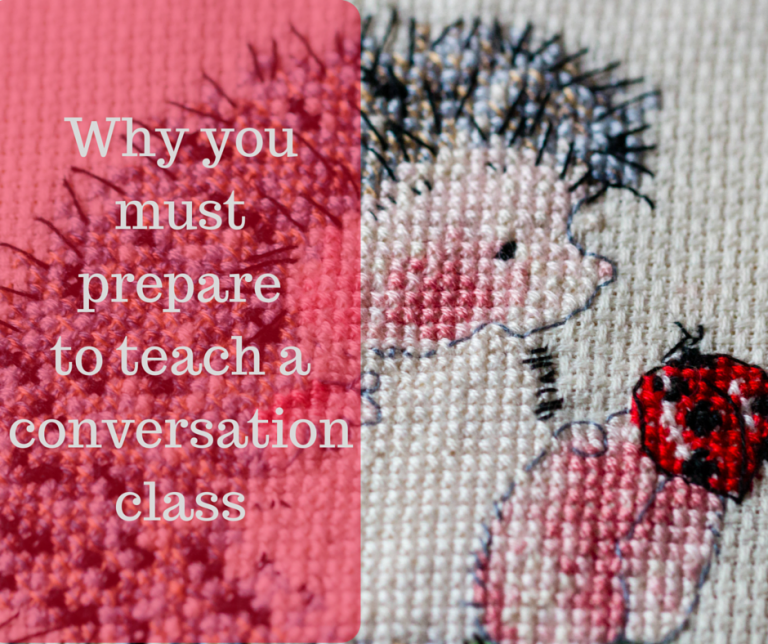
Teacher tips
Prepare for conversation classes
I’ve been teaching English conversation classes for nearly 7 years now.
My students have been a varied bunch.
- From teenagers to seniors over 90 years old.
- Students, job seekers, employees and retirees.
- Travellers, immigrants, artists, doctors and engineers.
- Even a handful of language teachers (no pressure!)
At first I thought I could wing it.
Conversation classes are easy to teach, aren’t they?
I was so wrong! I had been teaching with textbooks for several years before picking up a conversation class and my prep for these classes was minimal. Textbook examples sparked conversations. But in conversation classes there is no textbook. No syllabus. No road map.
It turns out that these classes are more demanding to teach. Plus it’s harder to keep students engaged and happy.
When you are UNprepared
In the classes where I went in without much of a plan, the students rarely talked. They didn’t smile, and they often didn’t return in the next class.
When I was unsure, it came through in my speech – I um-ed and ah-ed more than usual. This made my students unsure.
Unsure students don’t participate.
Before a couple of classes, I’d hurriedly gathered some realia – a few article clippings and some photos – without considering a theme for the lesson. Although, there was a little more speaking, the conversations died away quickly.
My first ever conversation lesson was with no plan nor handouts. I thought I’d be able to jot down the topics and grammar areas each student wanted to cover. But in reality, the class moved too quickly for me to write. Without prepared topics or conversation prompts, the students didn’t want to talk. In my second class in that course, I made sure to have the students fill in a form with that information, and came prepared.
From that first terrible class on, my initial classes in a course used the same wildly successful introductory lesson plan and handouts.
When you ARE prepared
Some lessons require a bit more preparation than others.
I have a reputation for providing (at least) one coffee-and-cake lesson per course, and that takes extra preparation time. It’s the chattiest and most relaxed lesson of the entire course. And is often cited as the reason a student signs up for my course instead of my colleagues’.
Bribing with food totally works!
But to be more serious …
The classes flow
You can select a topic and plan a warm up exercise that brings the required grammar and vocabulary to the front of the students’ minds. You can pick a variety of activities to keep interest up, choose games, videos or pop songs to provide a fun break. When I’m well prepared, my classes often threaten to run overtime – the students want to keep talking.
You can choose the topics the students want to cover
By selecting a variety of interesting conversation prompts around these topics, you lower the participation barrier – it’s easier to get the students talking freely.
A prepared teacher inspires confidence
I have noticed that participation is always higher in well prepared lessons. Plus when you prepare for the common mistakes students make with that topic or grammar area, you can design fun activities to take away their fear. Here are some more ways to build speaking confidence for language learners.
Homework prepares students
Plus they get to chat about who hasn’t done it, why, and then help each other to quickly complete it before the class starts. Although, I usually make written homework optional for conversation classes, when the students who don’t do it see how much further the diligent students improve, they usually start to do the homework too.
Students will actually prepare too
When they see you take the time to prepare for their class, students are more likely to do their own preparation. Prepared students are more confident and talk more. Chatty students are good for teacher morale.
Attendance is better
Some of my courses had low enrolment numbers to start with (bad timing at the language school), so drop-outs could have forced a cancellation. Higher attendance is also necessary for teacher morale.
You can re-use your materials and save time
The first few classes had a much higher preparation workload, but in later courses, with different students, I could re-use a lot of material and lessons with only minor changes.
You appear professional
Students will talk about you with other prospective students, and encourage them to join your classes, because they see you care enough to prepare for their classes. Being ‘in demand’ is good for teacher morale.
You can plan multi-lesson activities
This is more important for business English students or those who are learning English for the workplace. I have had great success with the medieval village business proposal project that spans 2-3 classes in all of my classes, both textbook and conversation, young and old.
You can bring just the equipment you need
As a ‘traveling’ language teacher, with no office, I don’t want to be carrying around more than I need for that class, especially when I have more than one class that day. I don’t need to bring my speakers or projector if there are no songs or videos prepared.
What have I missed?
How else does preparing for conversation classes help your students, or you? Do you have a horror story from an unprepared lesson?
Categories | TEACHING
Tags | teaching
01 Jul 2016